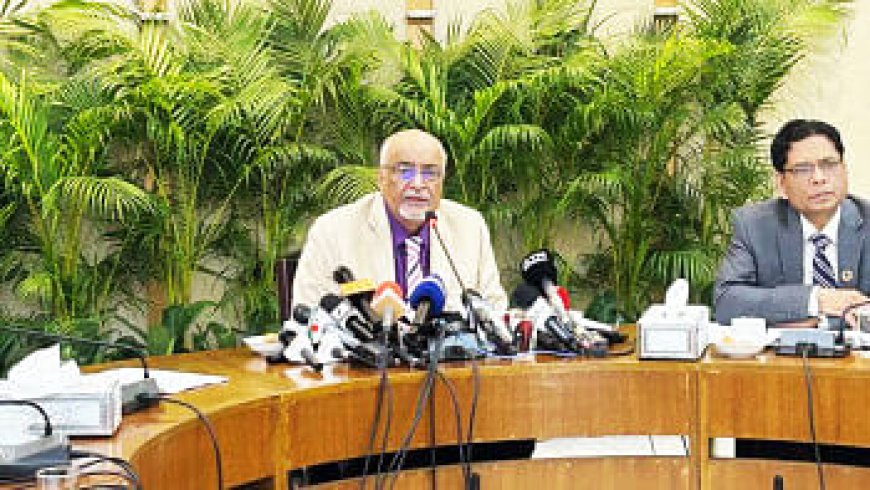The cost of seven major projects increased by 70% compared to the original estimate
According to the final draft of the white paper on the state of the economy, seven major projects initiated by the previous government ended up costing Bangladesh Tk 80,569 crore more than the original estimates due to rising costs and time overruns.

The construction of large infrastructure projects in Bangladesh faced challenges due to poor planning, corruption, and inadequate governance, leading to increased costs and missed deadlines. These projects include the Padma Multipurpose Bridge, the Multi-Lane Road Tunnel under the Karnaphuli River, the Dhaka Mass Rapid Transit Project, the Padma Bridge Rail Link, the Dohazari-Cox's Bazar Railway Track, the Payra Deep Sea Port, and the Matarbari Ultra Super Critical Coal-Fired Power Plant.
The initial estimates for these projects totaled Tk 114,547 crore, but the final cost reached Tk 195,116 crore. The white paper, under a chapter titled "Mega Concerns of Megaprojects," attributes this increase to poor planning and corruption, which created a "vicious cycle," forcing the country to spend over 70% more than initially estimated.
The report emphasizes the need for stronger project evaluation, improved procurement processes, and better oversight to prevent misappropriation. Without reforms, it warns, such inefficiencies could undermine Bangladesh's economic stability and development.
Mustafizur Rahman, a distinguished fellow at the Centre for Policy Dialogue and a member of the white paper panel, noted that the cost escalation resulted from the addition of many components, inflated land prices, and manipulated purchases. He explained that the costs increased by almost 70% due to the lack of proper cost-benefit analysis.
Rahman and his colleagues analyzed seven large projects out of 29 that each had an expenditure over Tk 10,000 crore. These 29 projects had total expenses of $87 billion (around Tk 780,000 crore).
The panel found common features in these projects, such as external borrowing on stricter terms compared to what Bangladesh typically receives. Repayment for many of these projects has begun or is set to begin soon, increasing the country's debt servicing obligations.
Corruption and irregularities, the report states, jeopardized implementation throughout the process.
Pre-Implementation Stage:
The preparation and approval phase revealed several issues, including substandard feasibility studies and a lack of comprehensive work plans. Projects often proceeded without securing land acquisition approvals, resulting in cost and time escalations. Financial limits set by the government were disregarded, baseline data was poorly gathered, and exit plans were weak. Inaccurate market assessments and the influence of "pet projects" driven by vested interests further undermined project viability.
Bureaucratic inefficiencies and delays in obtaining approval from ministries and international funding agencies compounded the challenges, while alternative scenarios were rarely developed.
Implementation Phase:
Implementation was marred by frequent revisions, non-compliance with schedules, and poor coordination among agencies. Transparency and accountability were weak, exacerbated by widespread subcontracting that compromised quality. Contractors often requested extensions, leading to significant delays and cost overruns. Fragmentation among implementing agencies further hindered efficient execution.
Post-Implementation Phase:
After implementation, several gaps remained, including the failure to submit project completion reports, inadequate maintenance budgets, and poor preservation of infrastructure. A lack of skilled personnel led to reliance on foreign contractors. Additionally, the absence of a system to assess the returns on mega projects hindered the evaluation of outcomes and the sustainability of public investments.
Flawed Cost-Benefit Calculations:
The report notes that accurate return-on-investment estimates are crucial for project justification. However, many mega projects lacked rigorous cost-benefit analyses. For example, despite a 26.5% cost escalation for the Karnaphuli tunnel between the DPP (2015) and RDPP (2022), the financial analyses, including the benefit-cost ratio and internal rate of return, remained unchanged.
Higher Costs for Substandard Quality:
The report found that construction costs in Bangladesh are significantly higher than in neighboring countries, yet quality remains subpar. For example, the cost of constructing a four-lane urban road in Bangladesh is much higher than in India or Pakistan, but the quality is lower. Projects like the Dhaka-Sylhet and Dhaka-Mawa-Bhanga highways saw exorbitant costs, primarily due to high land acquisition expenses, imported equipment, and challenging floodplain environments. However, these factors alone do not justify the discrepancies.
Systemic issues, such as inadequate feasibility studies, flawed designs, substandard materials, and frequent changes in project directors, contributed to cost overruns and delays. There was also a tendency for tenders to favor certain companies, facilitating collusion. A TIB review of 48 projects found misappropriation of over Tk 50,000 crore.
Recommendations:
The white paper suggests several corrective actions, including more rigorous evaluations of project financial viability, including cost-benefit analyses and sensitivity tests to assess cost escalations. It also calls for procurement system reforms to encourage competitive bidding and reduce corruption risks. Strengthening the capacity of the Implementation Monitoring and Evaluation Division (IMED) and other monitoring agencies is crucial to ensure projects are completed on time and within budget. The report stresses the need for transparency, improved governance, and stronger accountability mechanisms at every stage of project implementation.
What's Your Reaction?





















































































